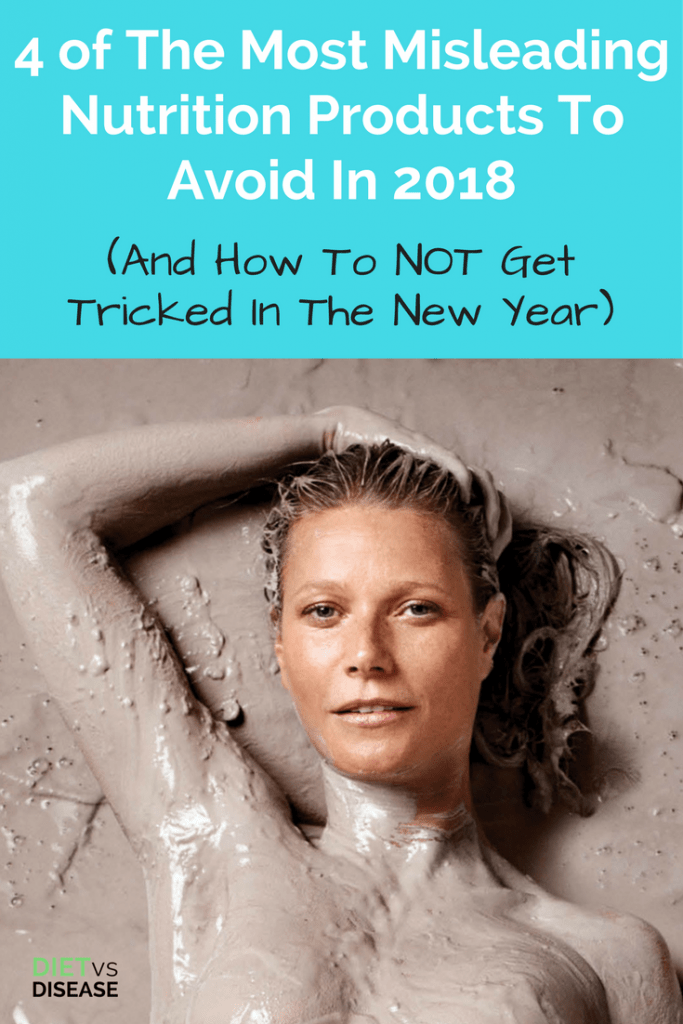The “wellness” market is predicted to become the next trillion dollar industry.
Problem is the majority of wellness products and supplements don’t improve our health… because we don’t actually need them.
We’re just tricked into thinking we do.
I’ve rounded up several of the most useless and misleading nutrition products to watch out for in the new year, followed by a guide on how to fool-proof yourself from dodgy products.
1. Coffee Enemas (Or Any Other Detoxes) By Gwyneth Paltrow
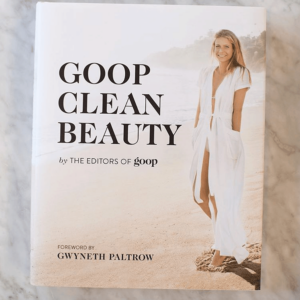
Actress Gwyneth Paltrow shares a variety of alternative health and “wellness” recommendations on her website Goop.
Every January they unveil a new detox that’s destined to be wildly popular in the new year… the promise of purification and atonement are seductive ideals deep-rooted in human psychology (1).
Problem is these detoxes and cleanses usually involve unnecessary food restrictions or dangerous habits.
The newest is a $135 coffee enema kit… yes, pumping your favorite morning brew up your rectum for “wellness”.
Unfortunately Fortunately, the origins of health enemas are based on ancient beliefs and untested theories that have since been discarded. I’ve thoroughly debunked all enema health claims here.
But it’s actually no surprise Gwyneth is promoting coffee enema kits. After all, she also sells ‘healing body stickers’, ‘sex dust’ and encourages women to regularly steam and put eggs up their “yoni”.
The reality is that Goop’s health advice is typically wrong. Nothing will improve your diet more than an eating pattern rich in whole foods like fruits, nuts and vegetables, with minimal junk foods.
But sensible is not sexy, nor profitable.
Ironically, despite Goop’s mission to help you “cleanse” and “detox”, the website has no hesitation in advertising or recommending alcoholic drinks.
Alcohol is labelled a Group 1 carcinogen by the World Health Organization, which means it’s a real toxin.
A thick, goop-y irony.

2. Isagenix IsaLean Shakes
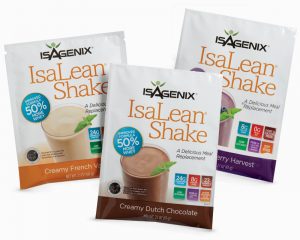
Isagenix is a weightloss supplement manufacturer that thrives on a “multi-level marketing“ scheme.
Put simply, every single person who recommends an Isagenix shake to you is on the payroll.
But what Isagenix says separates their IsaLean Shakes from other meal replacements is that they’re “clinically shown to support healthy weight loss.”
And it’s true, there is one published weight loss study that uses IsaLean Shakes. The findings were somewhat positive, not surprising given it was self-funded (2).
After eight weeks of poorly controlled dieting – which included 24 consecutive hours per week of fasting for some reason – those having two IsaLean Shakes per day lost more weight than those on a regular diet…
A whopping 3 pounds (1.4 kilograms) more to be exact.
So what this study actually reveals is that drinking two fewer bottles of water aids weight loss just as effectively as $390-worth of IsaLean Shakes + intermittent fasting.
Instead of buying Isagenix products, use that money to invest in healthy foods that you would otherwise consider too expensive, such as salmon, nuts or berries.
Combine that with some proven weight loss strategies and you will actually see results.
3. Bulletproof coffee
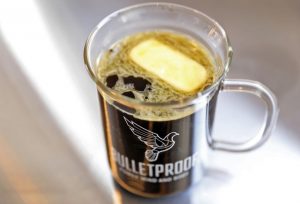
Bulletproof coffee refers to coffee with at least a tablespoon of unsalted, grass-fed butter mixed in.
Aside from ruining your coffee, the main issue is that butter fat appears to raise heart disease risk much more than fat from other dairy sources like cream or cheese.
Butter is low in what’s called milk fat globule membrane (MFGM), a protective membrane that reduces the cholesterol-raising effects of cream and its by-products.
The churning process used to turn cream into butter destroys most of the MFGM. This means having butter in place of cream or milk can increase the amount of LDL particles and ApoB in your blood, which are strong predictors of heart disease (3, 4, 5).
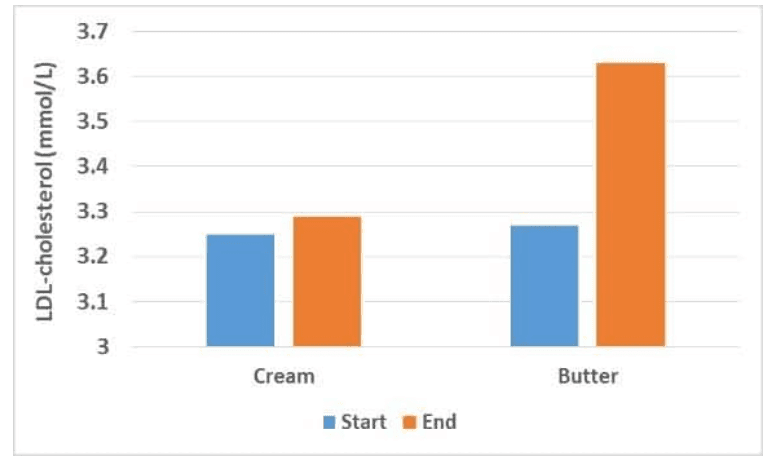
Butter (on the right) significantly increased LDL-cholesterol, whereas cream didn’t. There were also significant increases to total cholesterol, non-HDL cholesterol and ApoB levels compared to the cream group. Image source.
Additionally, drinking a tablespoon of butter adds a large and concentrated amount of isolated saturated fat into your diet on a daily basis.
Many nutrients are healthy when consumed as part of a whole food, but harmful when we start eating them in isolation and in large quantities.
For example, fructose is harmless when eaten in whole fruit, but a disaster when consumed in concentrated amounts from refined sugars, like you’d get in soft drinks (6, 7).
It’s likely the same with saturated fat. Neutral for health in whole foods, harmful in concentrated amounts like butter.
In the end, I know butter is delicious and I get why you’d want to eat more. But consuming it in this way, on a regular basis, is extreme and far outside of evolutionary norms.
4. Vaccishield
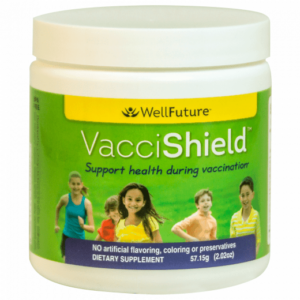
Vaccinating your child is terrible.
Did you know it makes them vulnerable and in need of support for good immune function, detoxification and a healthy brain?
Yeah… I didn’t know that either.
Neither did the epidemiologists, immunologists and infectious disease specialists who’ve spent centuries developing life-saving vaccines and the immunization schedule.
But that’s what a $28 bottle of multivitamins called Vaccishield claims to support.
Just what Vaccishield “shields” your child from exactly, and how, remains to be seen… And to be frank, never will be seen.
So how do people successfully sell pixie dust like this?
Well if you don’t make actual health claims, but rather fluffy structure-function claims such as “support health in the two weeks surrounding vaccinations”, then it’s permitted… Because it doesn’t actually mean anything.
Meaningless claims do not get monitored by the FDA (Food and Drugs Administration) because they do not require scientific evidence.
In fairness to Vaccishield, they donate a portion of each $28 sale to Vitamin Angels, an organization that helps combat child malnutrition. This is similar to what I do with ad revenue on DietvsDisease.org.
Philanthropy aside, Vaccishield is about as useful as a chocolate teapot.
How To Know If Your Supplement or Health Product Will Actually Work
Firstly, detoxes and cleanses are all an undefined scam.
When it comes to nutrition supplements and wellness products, keep in mind they’re exempt from any regulatory monitoring.
That means manufacturers are not required to prove their effectiveness, potency or purity before selling to you.
So if you voluntarily use health foods or supplements to “support” health then you need to take a more conservative, critical approach before making a decision.
Be weary of:
- Celebrity endorsements: Even if the celebrity means well, financially-driven recommendations do not confirm a supplement’s safety or effectiveness. This goes for pharmaceutical endorsements too.
- Meaningless health claims: Look out for claims such as supports health or general wellbeing, improves vitality, clinically proven, all-natural, and other fluffy statements.
- Weight Loss Supplements: From pills to patches and even weight loss tea, there are no shortcuts to weight loss.
I also recommend using this visualization of popular nutrition supplements to see where your supplement bubble sits.
In the end, I truly wish there were short-cuts and quick-fixes for unhealthy lifestyle habits, but it doesn’t work like that.
“There are no shortcuts to any place worth going.”
What do you think, do you agree with me? Share this article with a fact-denying friend who falls for these products all the time.

